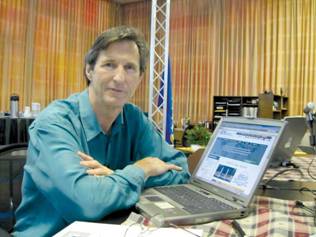 While there are
still some skeptics out there who remain unconvinced, a downtown energy
nonprofit continues to warn about climate change and what must be done to slow
it down.
While there are
still some skeptics out there who remain unconvinced, a downtown energy
nonprofit continues to warn about climate change and what must be done to slow
it down.
If the world doesn’t change its energy-consumption habits, Lindbergh Field and
Mission Boulevard will be flooded during high tides in less than four decades,
predicts Peter Meisen, president of the Global Energy Network Institute (GENI).
At the same time, he warns, San Diego’s average temperatures will climb by as
much as six degrees during the summer, sparking an increase in local wildfires.
Although the United States, Europe and China have plenty of energy now, “80
percent of it comes from some polluting source,” Meisen said. The engineer
started GENI 25 years ago to investigate a renewable-energy strategy for the
world. The institute’s aim is a global “quality of life for everyone in a
sustainable way.”
Meisen believes this can be accomplished with interconnected electrical networks
between countries, with an emphasis on tapping renewable energy resources. Besides
decreased pollution from fossil and nuclear fuels, he predicts, the networks
will produce such lofty benefits as improved healthcare, prosperity and even
world peace. By working together and encouraging trade between neighbors, he
contends, countries will be less likely to go to war.
Meisen said that 98 percent of the scientific community continues to believe
“addiction” to fossil fuel is changing our climate.
As for the
inevitability of cyclical change, he said, “We have gone beyond a threshold
of history in the last 60 years.” From 1960 till today, he said, the
concentration of carbon dioxide emissions in the atmosphere — a primary cause
of climate change — has increased 30 percent.
Meisen asks those who deny that human activity is a major contributor to global
climate change: How many 100-year floods or massive droughts or rising sea
levels do people have to experience before they start believing?
Currently, five staffers and 38 interns are conducting research and education
programs for GENI and its World Center Resources Simulation project. While GENI
focuses on electricity and renewable energy resources, Meisen says, the
SimCENTER can address and “visualize” dozens of interconnected complex
issues, including regional water issues, ocean pollution and the impacts of
population.
Five months ago, the group moved to a 4,000-square-foot “immersive
visualization facility” at Third Avenue and C Street. The researchers sit
in one cavernous room filled with computers and surrounded by a dozen
wall-mounted, 84-by-84-inch computer screens — the stuff of science fiction
movies.
Support for the non-profit comes from “angel investors” and proceeds from
renting its space out to businesses and other organizations for strategic
planning and training, Meisen said. The group also gets income from a limited
partnership with the MSCI Global Climate Index fund, which tracks 100 leading
companies working to reduce carbon in their products and services.
Meisen likens the current global situation to the Titanic:
“The unsinkable Titanic hits the iceberg and two-thirds of the ship’s
passengers and crew were lost,” he said. “What if the captain had ample
warning of the danger that lay ahead? The history of that fateful event would
be altered forever.” Today, he continued, the ship is much bigger and we
are all crewmembers, not just passengers.
“Do we have the capacity to mobilize before hitting the proverbial iceberg?” he asked.
The International Energy Agency has set the countdown clock to five years.
Before then, Meisen said, “We need to turn the corner on carbon dioxide
emissions or suffer dire consequences.” In response to skeptics of
climate change, Meisen has to ask: What if the smartest local scientists at
Scripps Research Institute, UCSD and San Diego State are right about climate
change? “Certainly the risk is there,” he said. “Why take the
chance?”



 While there are
still some skeptics out there who remain unconvinced, a downtown energy
nonprofit continues to warn about climate change and what must be done to slow
it down.
While there are
still some skeptics out there who remain unconvinced, a downtown energy
nonprofit continues to warn about climate change and what must be done to slow
it down.